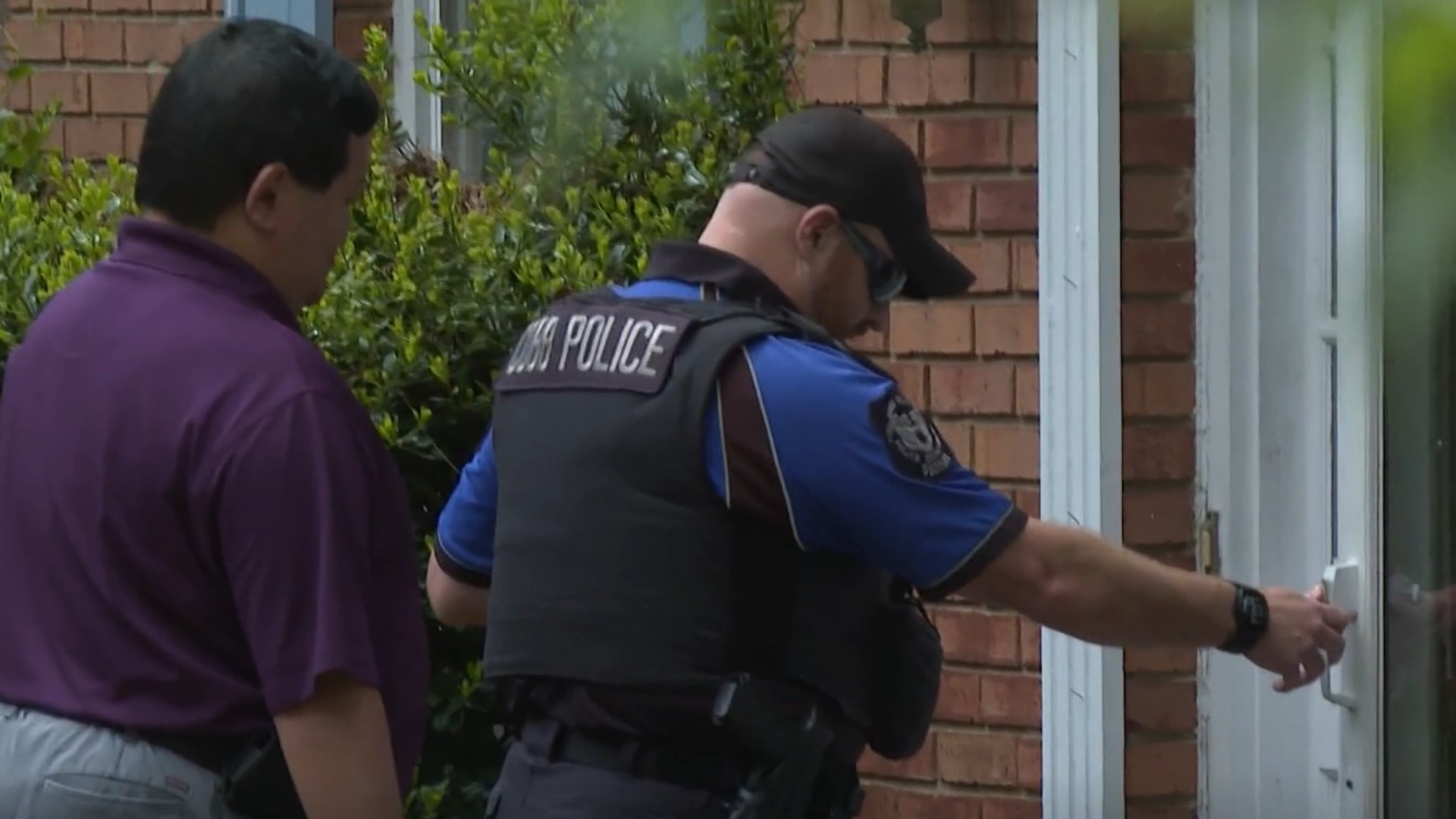ATLANTA — We rely on 911 to get help, fast. We count on police to calm the scene. But, a mental health crisis isn’t a car wreck or crime scene.
It's unfolding and confusing. It's emotionally messy, and it can take a lot of time.
Cobb County Officer Jacob King said it does not have to be that way.
“We’re averaging about 90 minutes to handle a crisis call versus the four to five hours it would have taken me before,” officer King said.
King said he was able to cut the response time by more than half by hiring Matt Dames. Every day, the behavioral health clinician sits shotgun with King to create Cobb County's first mental health response team.
Dames admitted the job is not exactly what he expected. Still, he called it, “a great adventure.”
CHANGING THE RESPONSE
In Cobb, Gwinnett, Forsyth or Athens-Clarke counties, there are now co-responding teams to help. Legislation passed this spring hopes to expand the list. Those involved in these teams understand why.
“I was seeing people in crisis, and we were sending people to the hospital, the emergency room. We thought we were helping them," King said. "And we weren’t because we were seeing them back sometimes hours, days, weeks later, and they were in the same condition."
“You were arresting the same people over and over,” said sergeant Robie Cochran, who created the first co-responder team in Athens-Clarke County. “My mindset now is I don’t arrest people. It’s been five years since I’ve made an arrest.”
So far this year, Cobb's team said they’ve only made three arrests. That takes the pressure off other parts of the system while getting the person the support they need.
“In some cases, they might have called 911 themselves or family members called three or four times a week," he explained. "That’s a considerable number of times that law enforcement officers or firefighters or ambulance crews are going out to those houses."
King said after one of Cobb’s teams got involved, 80% never called 911 again.
In Athens-Clarke, Sergeant Cochran said about one-third of the department's 911 calls involve some kind of mental health component. He said he reads every police report, about 80,000 so far, to see if there’s a reason for his team to follow up.
Athens-Clarke County is also working on something new: an alternative response team that would involve an EMT and a social worker.
“It takes law enforcement completely out of it," he said. "It would still come through the 911 dispatch, but then the dispatcher would say okay, this doesn’t necessarily need police response."
CRISIS INTERVENTION TRAINING
Captain John Radford, who heads Athens Clarke County’s 911 center, said to help triage calls, every dispatcher is trained in crisis intervention training (CIT). So is just about every officer.
“To recognize the signs and symptoms of a mental health episode and to de-escalate situations,” he explained.
The agency ties promotions to the training, so if you want to improve your rank and pay, you have to attend an advanced behavioral health training that goes beyond CIT.
Both Athens-Clarke and Cobb hope to go a step further and add a social worker to the dispatch team to handle mental health-related calls. Atlanta Police Department is also looking into the idea. Cobb seems the furthest along in the process with a proposal on how to do it already in place. Now, it just needs the funding.
BUILDING THE PROGRAM
While co-responders, alternative-response teams and embedded clinicians in dispatch are all helpful ideas, there is a problem facing every community trying to build their programs, according to Melanie Dallas, the CEO of Highland Rivers Behavioral Health.
“We’re dealing with the biggest workforce shortages we’ve had in the 34 years that I’ve been in this field," she said. "And, we’re seeing an influx of people who are in crisis and in critical need that we haven’t seen before.”
Highland Rivers is contracted to manage the community service boards (CSB) in the northwestern part of the state. CSB's help care for the uninsured and underinsured. Dallas points to low pay and high burnout rates as part of the staffing problem.
Both Cobb and Athens-Clarke said they would like to expand their number of co-responding teams to be able to handle crises later in the evening and on weekends. They have the officers, but they can’t find the clinicians.
Beyond pay, Cochran said there may be other concerns for clinicians considering these new types of mental health jobs.
“I think it’s the unknown," he said. "They don’t know what they’re getting into."
Instead of an office, these clinicians work in the field confronting crisis as it happens. It’s a fairly new job, so it’s not always clear what to expect and the hours aren’t always traditional.
'WE HAVE TO STAY THE COURSE'
After the crisis, comes the calm. The chance not just to save a life but to change it.
Dallas said she is grateful mental health captured so much attention this year at the legislature but said the conversations must continue.
“We need to have a local, a regional and a state long-term vision for how we’re going to impact mental health services within our communities,” she said.
She said she is hopeful Georgia is on the right track.
“This year was a stellar year for discussion around mental health," she said. "We have to stay the course. We’re not going to shift and change a system that is under capacity with one conversation and two bills.”
#Keeping is an investigative series that exposes the gaps in Georgia's mental health care system that cause thousands of children to be surrendered to state custody.
MORE FROM #KEEPING: 'We wouldn’t say, we can’t give you the treatment for stage-three breast cancer' | Father, lawmaker pushes for mental health reform in Georgia

